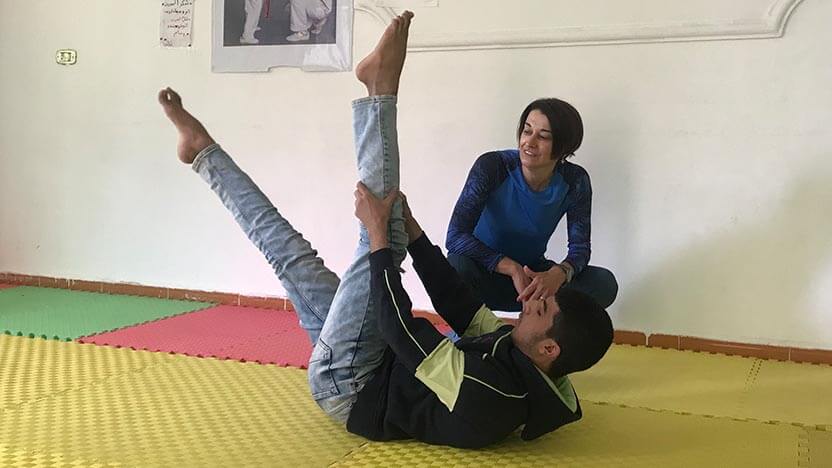
It’s not every day that you’ll find a Pilates instructor on the frontlines of a war-torn country teaching Pilates to refugees. But that’s exactly what Elizabethe Cardoso did after the civil war broke out in Syria in 2011.
“Many refugees from Syria began entering Jordan, where I was living at the time. Seeing the needs of these people fleeing the war, I wanted to do something to help,” says the Brazilian woman, who moved to the Middle East to study Arabic, work at a social institution and teach Pilates classes.
She started visiting Al Mafraq, a town in Jordan bordering Syria, to bring medicine and food to refugee families.
“I realized how scared and traumatized they were by the horrors of the war and then came the idea of using Pilates to help mainly children and women,” she says.
Inspired by Joseph Pilates who developed his exercise technique during the First World War and used it to rehabilitate soldiers and hospital patients, Elizabethe decided to put her STOTT PILATES® training and bachelor’s degree in physical education to use helping refugees.

She and another Brazilian woman, Paula Rocha, founded the A’ylah Center, registered as Mustaquibal Jidid Foundation (New Future Foundation), in Amman, Jordan, to address the needs of Syrian refugees and Jordanians living under the poverty line. The center also now supports Sudanese, Somali and Iraqi refugees.
“The word A’ylah means family in Arabic, which is not only the pillar of society but also our main focus,” she says.
“Since 2011, we have been reaching out to people living in poverty and refugee families and giving them goods, medical assistance and education. Supported by volunteer workers and national co-workers, the A’ylah Center acts in the areas of education and social development. Our aim is to give these families a sense of belonging and opportunities to help them reintegrate into society so they become active and productive members of society.”
This is done through different courses and workshops for kids and adults, including:
- Language classes in English and Spanish
- Music classes in piano and guitar
- Sports activities, including Pilates, soccer school, taekwondo training and Frisbee
- Arts and crafts, such as decoupage, jewelry-making, painting and woodwork
- Professional skills, such as sewing and knitting, farming and gardening, recycling, hairdressing and beauty treatments

How does Pilates benefit the refugees you work with?
Elizabethe believes that because of Pilates’ emphasis on the mind-body connection, it can be used as a tool to help people manage and process both physical and psychological sensations. It provides a sense of balance, helps people become more focused, and can offer a physical release as they experience and discover the joy of Pilates movements, she says.
“The concentration required in Pilates helps people develop an incredible capacity for resilience and hope for something better in their lives. Even though they lost everything in the war, they find they haven't lost the ability to rebuild themselves,” she says.
One such person was Samer, a young boy who fled Syria with his family. Even after leaving Syria, he was too afraid to go out for fear of bombings and attacks, so Elizabethe started teaching him Pilates at home.
“I noticed that through the exercises, he started to change and talk more about himself and his fears. He became more associative and healthier. The exercises were done at his house at first as he was too afraid to leave, but now, once a day, he leaves his house to visit our center to take Pilates classes and he’s been able to return to school,” she says.

What are the goals of your Pilates classes for refugees?
Elizabethe’s aim is to introduce more people suffering from trauma, depression, anxiety, etc. to the mind-body benefits of Pilates and to guide them towards discovering how the Pilates principles can improve their quality of life.
“First I build a trusting relationship with them. Then I do an analysis to determine how I can use Pilates exercises to help them. I try to emphasize the core principles of Pilates so that students learn to perform the exercises with excellence and can enjoy its full benefits,” she says.
“”
Pilates has the power to change lives. I have seen the Pilates method restore people.
“The experience of teaching Pilates to refugees has been very gratifying,” Elizabethe says. “If all Pilates instructors had an awareness of the impact and knew how to leverage the full physical and psychological benefits that Pilates offers, they could contribute even more to changing and improving the lives of many people at risk.”
Looking for a meaningful and rewarding career? Become a STOTT PILATES Certified Instructor >